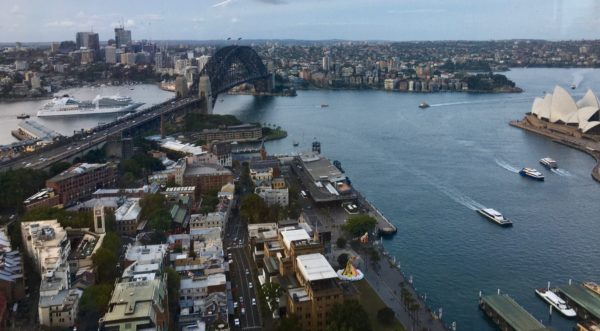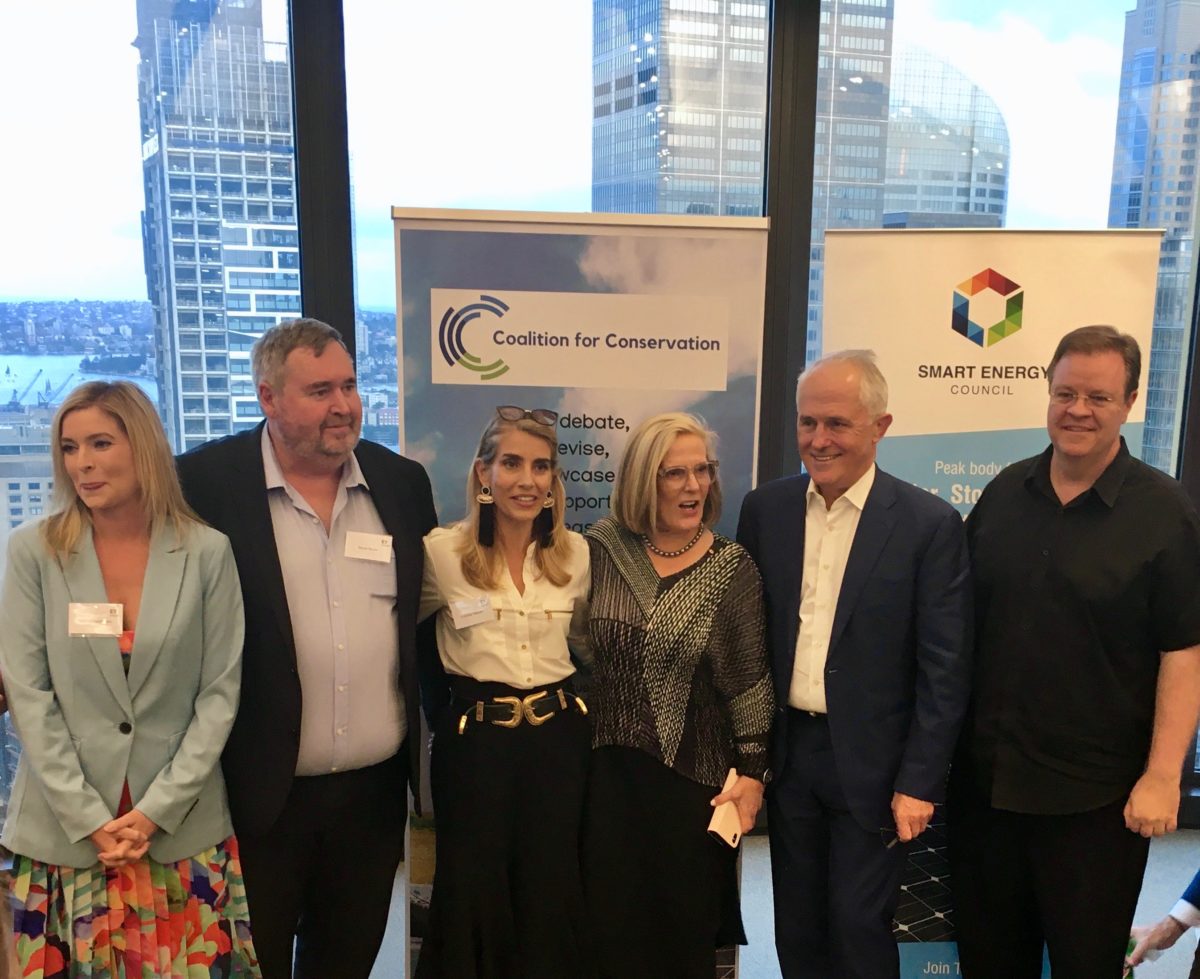On Wednesday evening, in the elevated eyrie of EY’s carbon-conscious offices in Sydney’s George Street, the Smart Energy Council convened an event — Energy and Climate Conversations with Malcolm and Lucy Turnbull AO. Or was it a soiree hosted by the Coalition for Conservation, whose chairperson Cristina Talacko described her group’s mission as, “to influence the Government, especially the conservative side of the government, to take more action on climate change”?
Over canapes in the reception area, one staunch Liberal remarked, “This is a Liberal Party function and I can only see one person I know.”
In fact, party-agnostic scientists, independent politicians, hospital emergency physicians and concerned leaning-away-from-Liberal citizens eventually crowded into an over-subscribed room to pepper the former Prime Minister with sticky questions: “Independent MP Zali Steggall will be introducing a Climate Change Bill into parliament in March. What will it take for moderate MPs to cross the floor and support this bill?” asked Julie Giannesini, Steggall’s Electorate Officer.
Malcolm Turnbull, who crossed the floor in 2010 to vote in favour of Labor’s emissions trading scheme quipped, “You’ve got to ask them. I don’t know. I haven’t crossed the floor as often as Barnaby Joyce. I don’t think anyone has… [For] people like Dave Sharma and Tim Wilson who made it very clear they supported action on climate change, this will be a challenge for them, but that’s their responsibility as MPs.”
How to make friends and influence people
From Professor Renate Egan, who leads UNSW participation in the Australian Centre for Advanced Photovoltaics and who co-founded Solar Analytics: “I’ve been a solar technologist for 25 years and the people I work with are all of the same mind as me, and in this room I feel like I’m in an echo chamber. How can we change the minds of others?”
A number of answers emerged to this central question.
John Grimes, CEO of the Smart Energy Council, who has strategically partnered with the Coalition for Conservation to bring an informed industry perspective to persuade Australia’s seemingly intransigent centre right, said that business, the Liberal heartland motivated primarily by economic realities, is key.
“Today, the leadership we see on climate is coming from the business sector, right across the board,” said Grimes. “At our Smart Energy Summit in December, QBE told us they’re not writing anymore business for coal generators and those in the coal industry. That’s the insurance companies saying the risk is too high.”
He added the risk of not responding to customer demands for action, and the risk of turning away current and emerging generations of employee talent who don’t want to work for polluters as among the factors that are encouraging all kinds of businesses to sign renewable power purchase agreements, reduce air travel, install rooftop pv systems and moderate electricity use.

Image: pv magazine, Natalie Filatoff
The former PM, had already set the most persuasive argument for orderly energy transition, reminding the audience that, “The bottom line today is that the cheapest way to generate electricity in Australia is a combination of renewables, principally PV (solar) and storage (pumped hydro). AEMO’s own estimate is that photovoltaics plus six hours of pumped hydro is $40 a MWh, cheaper on a levelised cost of electricity basis than new black coal.”
But this is already a known fact, and it’s not swaying MPs of the illogical far right as they, incredibly, argue for greater support for coal.
Also widely acknowledged is Turnbull’s assertion that “We would have more investment if we just gave a set of rules. We’ve got to say, Where do we want to get to? We want to get to a point where we’re not burning any coal and gas… We want to do so on the basis that we keep energy reliable and affordable — that’s simply a matter of planning. We have all the tools to do it.”
This answer doesn’t quite hit the how-to, but Turnbull made another point that opened a path to change. He said in his opening address that, “Conservatism, surprisingly enough is about conserving things, it’s about prudence, it’s about moving forward in a way that preserves the best of the past, as you embrace change.”
Ignoring climate change, then, is not only imprudent, but the antithesis of conservatism.
Boris Johnson as conservative climate-change icon
The Turnbulls each praised conservative UK Prime Minister Boris Johnson for his climate stance: for embracing net zero by 2050 alongside an aggressive emissions-reduction agenda.
Talacko is onto it. She reminded the audience that in countries such as the UK the environment is a conservative platform. In Australia, although politicians of the centre and even some of the centre right may support climate-change mitigation, this policy area seen as the purview of the Greens and the Left, and to argue or vote for it as an LNP member is risky.
“To mitigate that risk, we’re organising a group of conservative MPs to come here from the UK in August. We want to get them in a room with our MPs who are either centre right or moderates, to understand how to build that courage, how to start being the conservative side of politics that looks after the environment,” said Talacko.
Voters must exercise their right to write
The actions of individuals appealing directly and individually but en masse to their local minister emerged as one of the most effective catalysts for making politicians aware that their political future, if not their own quality of life, depends on supporting energy transition.
Paula Chavez, Senior Legal Counsel for Licella, an Australian technology company that has pioneered the conversion of low-value waste into high-value biofuel, cited her local MP, Fiona Martin, Federal representative for the electorate of Reid, as an example of a Liberal politician whose outlook on climate action had been changed by voter opinion — letters to be precise.
“She’s been in the news saying she understands the climate change problem, and it’s because of her constituents writing to her and telling her over and over again …” said Chavez.
Giannesini was working the crowd before and after the event to whip up more letters to parliamentarians in support of Steggall’s Climate Change Bill, which will enshrine steps toward zero emissions by 2050 in legislation.
“It’s one thing to complain that we need more action on climate change, but we actually need to get behind policies and start pushing them. We need to flood MPs,” she said.
Putting Climate Change into legislation
In addition, Steggall’s Climate Act Now website, launched today, seeks to familiarise voters with the bill and gather signatories, marshalling them into constituencies, ready to provide individual MPs with numerical evidence of support among the people they represent.
“Political will is not just a matter for politicians; above all it’s a matter for the Australian people,” agrees Turnbull. “Once the politicians and the political parties recognise that there is a political cost in not addressing climate change in an effective way, then things will change.”
He says many people in the LNP have assumed that they can take a large percentage of their vote for granted, but that they are vulnerable in places such as Central Queensland where the coal lobby has mounted a powerful case for associated employment opportunities.
“The reality is that there are more jobs in a clean energy future, vastly more, because for a start we’ll have not just cleaner but cheaper electricity,” says Turnbull, which, as a major cost of doing business, will allow enterprises to thrive.
Prosperity and economic growth dependent on energy transition
Transitioning our economy, said Lucy Turnbull, Chief Commissioner of the Greater Sydney Commission, “is the only chance we have of prosperity. It’s not an either or. If we don’t manage climate change you can forget prosperity. You can absolutely forget economic growth.”
She added that we must acknowledge the trauma experienced by Australians devastated by what she calls this black spring and black summer; “We have to respect the horrendous experience they’ve had, and we have to try to do our very best to do something about it.”
Waiting for incumbent politicians to find their conservative roots and claim their remit to custodianship of “the way we were” has not proved to be an effective action plan. “We need every single MP to feel it,” says Giannesini. “That’s the only thing that’s going to turn it.”
This content is protected by copyright and may not be reused. If you want to cooperate with us and would like to reuse some of our content, please contact: editors@pv-magazine.com.









By submitting this form you agree to pv magazine using your data for the purposes of publishing your comment.
Your personal data will only be disclosed or otherwise transmitted to third parties for the purposes of spam filtering or if this is necessary for technical maintenance of the website. Any other transfer to third parties will not take place unless this is justified on the basis of applicable data protection regulations or if pv magazine is legally obliged to do so.
You may revoke this consent at any time with effect for the future, in which case your personal data will be deleted immediately. Otherwise, your data will be deleted if pv magazine has processed your request or the purpose of data storage is fulfilled.
Further information on data privacy can be found in our Data Protection Policy.